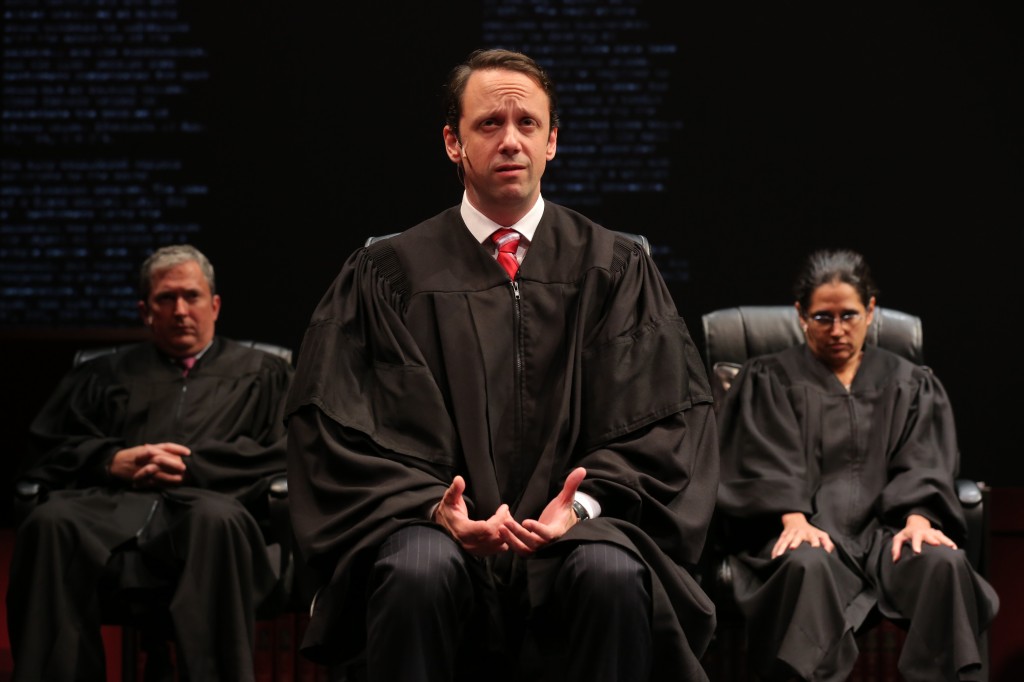
- Washingtonian April 4, 2014
- Chicago Sun Times March 12, 2014
- Slate October 23, 2013
- Metro US October 21, 2013
- The American Conservative October 18, 2013
- Wall Street Journal October 7, 2013
- Gothamist October 2, 2013
- New York Magazine September 26, 2013
- Broadway World September 24, 2013
- The New York Observer September 24, 2013
- The Village Voice September 25, 2013
- Entertainment Weekly September 24, 2013
- Theater Mania September 24, 2013
- Curtain Up September 25, 2013
- The New York Times September 24, 2013
- The Village Voice September 4, 2013
- The Paris Review May 31, 2012
A satirical look inside the Kitty Kat Lounge case
by Chris Jones
In the case of Barnes v. Glen Theatre Inc., the issue at hand was whether the state of Indiana’s demand that the dancers at the Glen Theatre and the Kitty Kat Lounge in South Bend, Ind., wear both pasties and G-strings as they did their thing was a violation of the First Amendment’s guarantee of freedom of expression.
The dancers said, in essence, that their desired nudity was a crucial aspect of their performance and thus was protected speech. Indiana said, in essence, that its prohibition of public nudity was a reasonable law and that if it made an exception for the artists of the Kitty Kat Lounge, it would logically have to do so for anyone who chose to sashay nude down, say, the streets of Munster.
The case, which is the subject of the fascinating show, “Arguendo” by Elevator Repair Service, went all the way to the Supreme Court in 1991, where the justices, perhaps unwisely, delved headlong into the tricky realm of defining erotic dance and exploring the limits of expressive artistic performance.
New York-based Elevator Repair Service, best known for the stunning “Gatz,” was at the Museum of Contemporary Art for just this weekend, a great shame, really, given the many Chicago fans of this highly original theater company and the fascinating audacity of “Arguendo.” The play manages to be both intellectually fascinating and a deft depiction of the sheer absurdity of the collision of two-bit eroticism and legal pretension, an aspect Elevator Repair Service suggests by having one of the two lawyers who argued this case eventually end up in a G-string of his own.
“Arguendo,” directed by John Collins and seen at New York’s Public Theater last year, takes as its text the actual arguments in the case, as well as the justices’ responses and some things said to the news media outside the court. These matters of public record are performed with a beguiling mix of realism and absurdity. There are only five actors, so the performers switch back and forth between playing the likes of Ruth Bader Ginsburg and Antonin Scalia, the arguing attorneys and so on, making sudden switches in their comfy chairs from the physical embodiment of one colorfully distinct justice to another. There aren’t full-on impersonations, in totem, but Susie Sokol, who mostly plays Ginsburg, manages not only a dead-on physical take of that particular justice but somehow evokes some of her inner angst in the Rehnquist court.
Fans of this company will, of course, have seen that trick before. Elevator Repair Service knows how to satirize but with work that also captures emotional longing and insecurity.
That might seem like an overstatement for a play composed of re-enacting an argument before the Supreme Court. But this was a very interesting case for artists and intellectuals, not least because you really can see both sides. Indiana’s argument that the state was not preventing artistic expression (the dancers could dance how and all they wanted), just not allowing public nakedness, has some logic. So does the reverse: How can an erotic dancer not be harmed creatively by such a law? As I am sure Elevator Repair Service intended, you end up arguing in your own head about the extent to which our most private parts can achieve public expression, and I speak here of the artistic kind.
It is a good question, though, as this highly unusual and entertaining show so richly proved, not one the justices were especially well-prepared to answer, which is, of course, why we have the First Amendment and its admonition that these matters are best left to individuals to decide for themselves. While naked, if they wish.
Read the original article here.